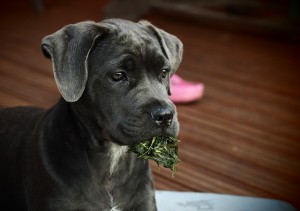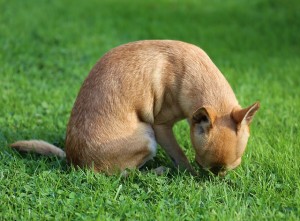Why Dogs Shouldn’t Eat Grass And How To Prevent It

A lot of dogs are attracted to grass. It’s important to learn how to prevent your dog from eating grass as too much can cause problems.
WHY DOGS SHOULDN’T EAT GRASS AND HOW TO PREVENT IT
Why does my dog eat grass? This is one question that may have crossed your mind during the last several weeks when grass has reappeared in the St. Louis area. Indeed, it can be quite a strange sight and a legitimate cause for concern to watch your dog chomping on some fresh grass in your yard.
WHY DO DOGS EAT GRASS?
Eating of grass or other inedible objects is referred to as Pica, is a phenomenon that is common with dogs. Since they can’t speak for themselves, it is difficult to tell why dogs choose to sometimes eat grass. Opinions differ on the reason for this behavior and some of the reasons put forward are as follows:
Natural Instinct – Like their other canids such as wolves and coyotes, dogs may eat grass as a part of their natural food cravings
Part of growing up – Puppies and young dogs may eat grass or other materials in their quest to investigate their environment.
Boredom – Dogs may resort to eating grass as a way of escape from the boredom of routine activities or eating routine meals.
As a dietary supplement –Since fresh grass is rich in nutrients, some believe that a dog may eat grass to meet some nutritional needs.
As a cure for stomach disorder – Another reason that has been put forward is that dogs eat grass to induce vomiting when they feel nauseous or as a result of bloating, viral or bacterial infection and some other gastrointestinal disorders.
WHY YOUR DOG SHOULDN’T EAT GRASS
While veterinarians generally consider dogs eating grass as normal behavior, it is important that you try to prevent your dog from eating grass as a habit because of its implications for his or her general well being.
Digestion
Unless they are first crushed or semi-digested, the digestive systems of dogs are not wired to effectively handle plant materials. Grass eating should therefore be discouraged in order to prevent complications.
Can Lead To Compulsive Behavior
As earlier stated, puppies and young dogs may eat grass or other materials as part of their growing up. With some discouragement from you, this behavior should cease before they are six months old. If allowed to persist, grazing may become a compulsive behavior that continues into adulthood. Then it becomes a real issue, and dealing with it may cost you both time and money.
May Lead to Poisoning
Then, there is the danger of your dog eating grass that has been treated with an herbicide or pesticide. Also, some household and garden plants are harmful to dogs. Not curbing this behavior will make your dog want to eat grass any and everywhere, thus increasing the possibility of her getting poisoned from grass containing poisonous chemicals.
HOW TO PREVENT YOUR DOG FROM EATING GRASS
Exercises
One good way of getting your dog’s attention off grass is by engaging him in fun interactive activities such as throwing a Frisbee, throwing a ball, or engaging in a tug-of-war. Taking regular walks is also a very good way to keep your dog busy. If your schedule doesn’t allow for this, you can talk to us at stlouisdogwalkers.com and we’ll be glad to help you out.
Provide Alternatives
Another thing you can do is buy toys and other play things that are durable enough to chew on without being broken into bits. These can help keep your dog mentally active and prevent boredom.
Close Monitoring and Training
Since compulsive pica will require more specialized help and a lot of reorientation, why would you want to go through that route? Curbing grass eating early is very important. You therefore have to be on the lookout for such behavior in your puppy. Training your dog to obey certain verbal cues such as “leave it” or “drop it” will help you to better communicate your disapproval of certain actions.
Diet Improvement
Giving your dog a high fiber diet regularly may help curb grazing. Certain instances may warrant a complete change of diet in which case, you may need to see your vet. You can also include probiotics and digestive enzymes into his or her diet to help improve his digestive system.

